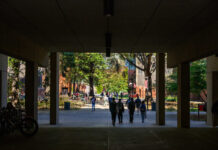
The eyes of the world have turned to Tokyo and the 2020 Olympic Games.
While many watching the Games are fans of specific sports or athletes (UofL has 10 current or former students competing in Tokyo), other viewers simply enjoy the fun of the competition.
Few, however, know more about the work that goes into organizing an Olympic or Paralympic Games than UofL professor Mary Hums.

A professor of sport administration from the College of Education and Human Development, Hums has spent the majority of her career researching, watching and participating in international sport.
“I’ve worked for the Paralympic Games (in 1996, 2002, 2004, and 2010), one Pan American Games, and one Olympic Games,” she said.
In 2006, Hums was selected by the United States Olympic Committee to represent the U.S. at the International Olympic Academy Educators Session in Olympia, Greece.
“I took a sabbatical and moved for six months to Greece, which was where I was able to work on both the Olympic and Paralympic side,” she said.
There as a researcher and educator, Hums was active in event operations for softball as well.
“I did a lot of work in the office with organizing and daily scheduling activities,” she said. “During the games, my job was as a groundskeeper. For every single softball game of the 2004 Summer Olympics, I made the batter’s boxes. This was in addition to my daily responsibilities of maintaining the training facilities and competition field, but my primary responsibility was making the batter’s boxes for each game.”
Hums stayed on following the conclusion of the Olympic Games as the sports information director for the Paralympic sport of Goalball, a team competition designed for the visually impaired. After the Paralympic Games ended, Hums returned to the States.
Hums, whose research centers on sport and human rights as well as the inclusion of people with disabilities, women and racial/ethnic minorities in the management of sport, believes this year’s games will be set apart from years past for a number of reasons. Delayed by one year due to the COVID-19 pandemic, competitors have also become more vocal about social issues and change.
“That’s a pretty hot button topic right now … how much of a voice athletes are going to be able to have in terms of making personal statements about social issues” Hums said.
As a co-coordinator of the Athletes and Social Change Forum in conjunction with the Muhammad Ali Center, Hums works to amplify the voices of athletes in social change. Through Rule 50, the International Olympic Committee (IOC) prohibits demonstrations, along with political or religious propaganda at Olympic sites and venues.
“The whole premise of these rules is that the Games are not to be politicized. And yet sport is and has always been political,” she said. “People say, ‘I don’t want my sports to be political,’ or ‘athletes should shut up and dribble.’ But, even from the ancient Olympic Games when people came in from the warring city-states and competed with one another, it has been political.”
The rule has come under increasing scrutiny in the months leading up to the Olympic Games, and it is one Hums believes will be in popular conversation as athletes increasingly make political statements.
“National and international sport governing bodies are grappling with how to respond in a way they feel is appropriate. It’s very interesting,” Hums said. “Athletes certainly do not leave their rights at the starting line.”
“I think sport has the power to do three things: to inform, to empower, and to transform. And it goes in that order. So that’s why it’s taking front and center right now with the Olympic Games and Paralympic Games. I think that [social statements] are here to stay as long as it takes for social change to happen,” she said.
As for sports and athletes to watch over the course of the 2020 Tokyo Games, Hums has a rather nontraditional recommendation.
“Women’s field hockey,” she said. “Not only is one of the elite goalkeepers in women’s field hockey an alumni of UofL (Ayeisha McFerran of Ireland), but it’s also a sport I played as goalie for four years as an undergraduate at Notre Dame.”
For the Paralympic Games, Hums recommends tuning into the cycling events, in which Louisville native and ESPY Award finalist Oksana Masters will compete.
You can learn more about Mary Hums and her work here.































